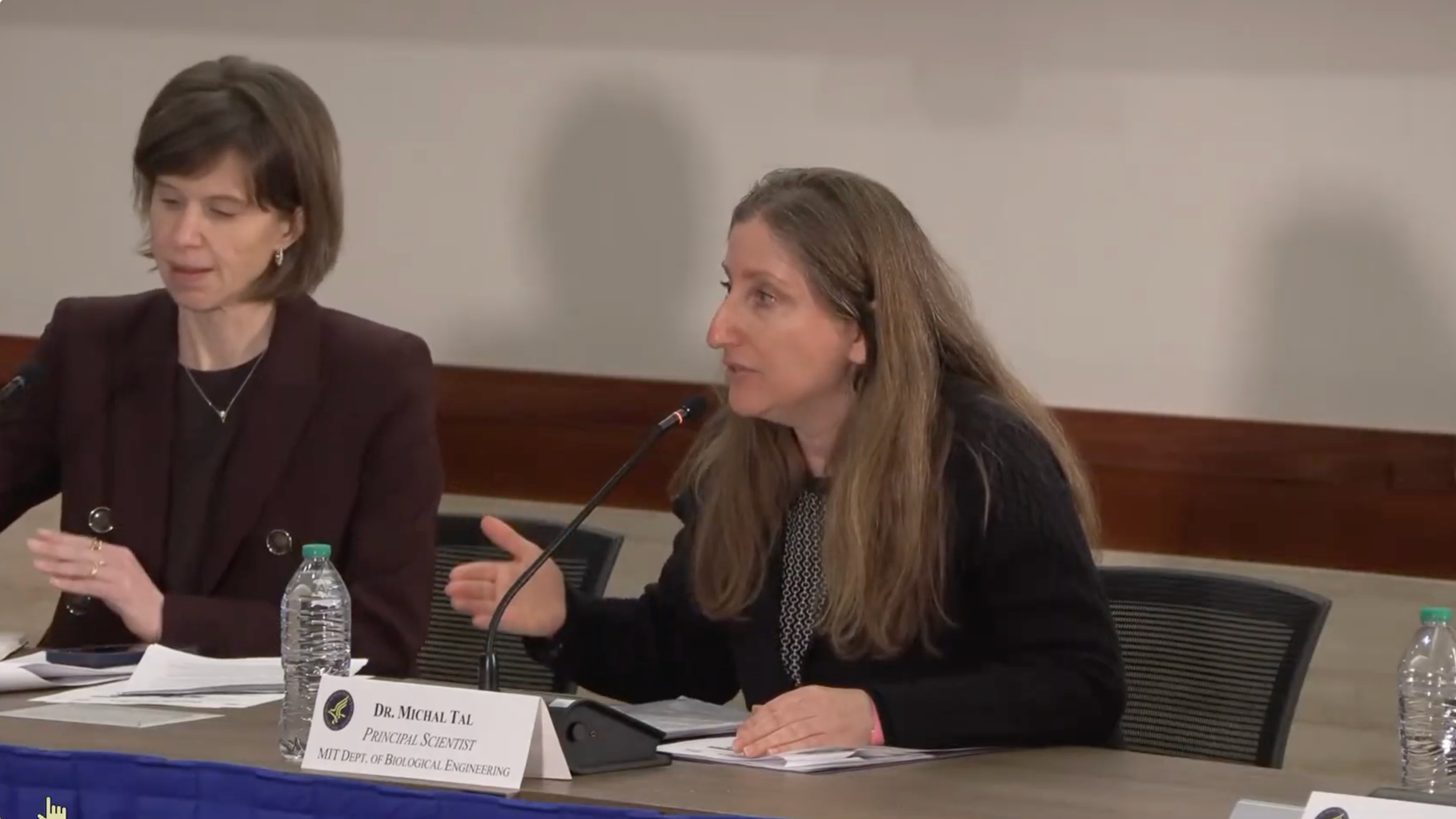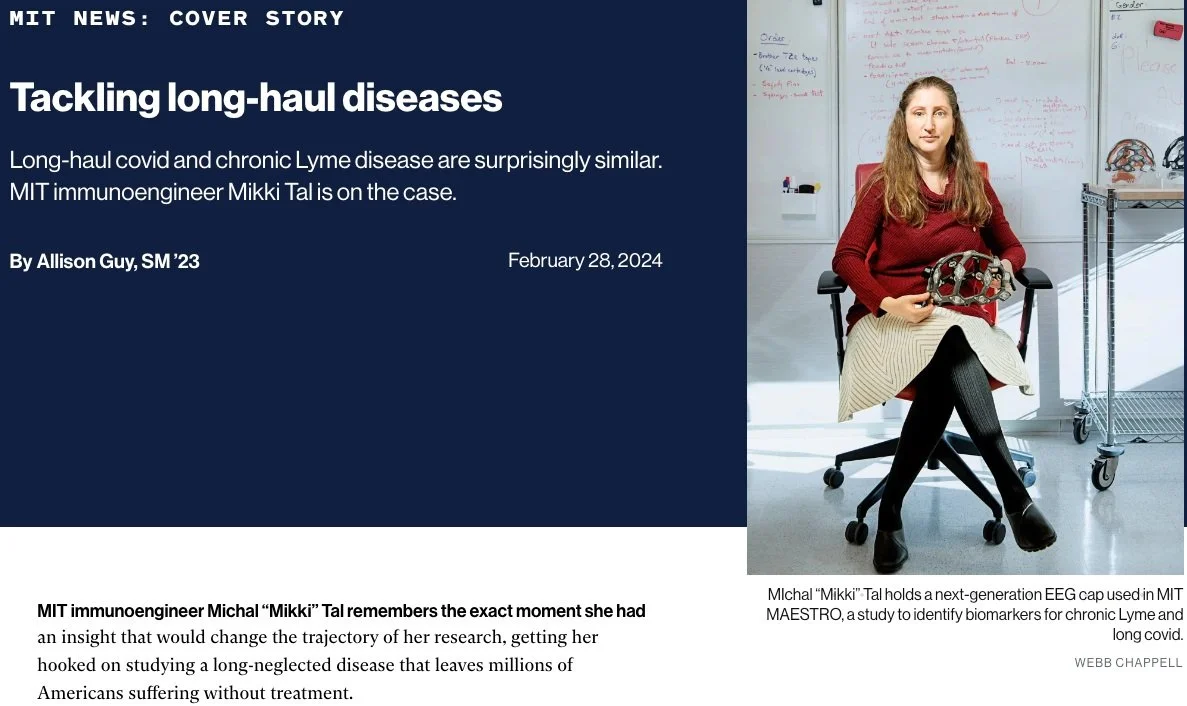Featured media
“On Dec. 15, Michal (Mikki) Tal, an immuno-engineer at MIT’s Center for Gynepathology Research, was invited to the U.S. Department of Health and Human Services (HHS) for a high-level roundtable discussion on Lyme disease. The event, which included Secretary Robert F. Kennedy Jr., Senator Susan Collins, and leadership from the NIH and ARPA-H, focused on addressing critical gaps in federal support and diagnostic capabilities for tick-borne chronic illnesses.”
“‘The reason chronic Lyme is an ‘invisible illness’ is because we don’t have the tests to measure it,’ Tal noted during the session. ‘At MIT, we are rooted in engineering. We are looking at this as a set of solvable problems.’”
- The Center for Gynepathology Research - Link to compilation video
“Dunoyer signed up for the MIT trial in spring 2024, and her husband joined as a healthy participant. The pair had their blood drawn and sweat, saliva and urine collected, took neurological tests and underwent a test to evaluate blood flow to the brain, which Dunoyer couldn’t finish because she got nauseous and felt like she was going to pass out. The experience drained her for the next week, but she is glad she participated, she said.
‘What we’re trying to do is measure everything,’ said Michal Caspi Tal, an immunologist at MIT, who is leading the study, which also includes acute Lyme and long Covid participants. ‘I want to find a way to give people hope.’”
- The Wall Street Journal
“Mikki is really a leader about thinking about sex differences in immunology.”
"Tal suspects that the sex disparities seen in chronic Lyme and other pathogen-triggered chronic diseases might come down to the fact that men mount a more robust response to acute infection… Pathogens that escaped the initial blitz could take up long-term residence in the body, potentially causing persistent symptoms. And women have a higher chance of chronic illness.”
- MIT Technology Review
“This could be a diagnostic for chronic Lyme,” she said, referring to the distinct “antibody signature” she sees early in the infection of people who will go on to develop chronic Lyme. “There is an incredible similarity to the signature people have a decade later who did not recover.”
- Michal Tal, The Boston Globe
“‘What got you into science?’…
’I was an undergrad, and I took an immunology class and I was just, like, this is what I want to do for the rest of my life… The answers are here.’ - Mikki Tal”
- Microbe TV
“Tal is studying the immune systems of people for whom treatment works versus those for whom it doesn’t, in hopes of predicting who will go on to develop chronic symptoms so that doctors could intervene early with immune-system-altering drugs and better monitor patients' recoveries… Akiko Iwasaki, an immunobiologist at the Yale University School of Medicine, is working with Tal to map an immune profile of chronic Lyme, analyzing patients’ blood and saliva samples to search for biological markers that may differentiate people who have long-term symptoms from those who don’t.”
- Time Magazine
Tal’s group at MIT is researching immune markers to predict who will develop chronic symptoms after a Lyme infection (and who won’t). They hope this will help improve the design of future clinical trials for chronic Lyme treatments and help people access these treatments earlier in their illness, before symptoms become severe.
She’s also looking into sex differences in immunity. “Most of these significantly underfunded diseases are female-skewed,” Tal says, pointing to both long COVID and long Lyme as examples. “[Women] are 51 percent of the population. We can't just disregard diseases that primarily affect women.”
- Well + Good
“Beth Pollack leads and is building a new research unit at MIT studying the overlapping pathomechanisms and comorbidities among Long COVID, ME/CFS, and a group of related illnesses… Pollack forsees a new era for chronic disease research.”
- The Yale School of Medicine Magazine
“The Tal Research group at MIT.. is conducting a large study looking into both Lyme disease and long COVID. The goals are to identify biomarkers that can predict who will not recover and to advance available treatments.” MedScape
Media featuring members of the Tal Research Group
HHS Lyme Disease Roundtable Full recording, Compilation of Dr. Tal’s remarks (July 20, 2025)
The Wall Street Journal, Chronic Lyme Disease Was Once Dismissed. More Doctors Are Coming Around. (July 20, 2025)
Make Visible: Understanding Complex Illness, Podcast, #16 Why are women more susceptible to complex illness? Predicting chronic conditions with Michal Caspi Tal, PhD (June 13, 2025)
NeurologistMom, YouTube, A message from Michal Caspi Tal on Long COVID Awareness Day 2025 (March 15, 2025)
Bay Area Lyme Foundation, Understanding Infection-associated Chronic Illness: How the Immune System Responds to Persistent Infection (September 4, 2024)
Immune Booster #2, Podcast, Sex differences in immune responses with Michal Tal (July 9, 2024)
National Public Radio, Marketplace, Long COVID can make work challenging. Accommodations can make a difference (May 22, 2024)
Well + Good, Is Long COVID the Match That Will Finally Light a Fire Under Research Into Women’s Reproductive Health? (May 17, 2024)
IdeaCast, Harvard Business Review Podcast, The Hidden Burden of Long Covid and What Companies Can Do (May 14, 2024)
Harvard Business Review Long Covid at Work: A Manager’s Guide (May 7, 2024)
Time Magazine, Long Dismissed, Chronic Lyme Disease Is Finally Getting Its Moment (May 16, 2024)
Well + Good, ‘Chronic Lyme’ Patients Are Getting Left Behind, but Long COVID Research Is Sparking New Hope (May 15, 2024)
Important not Important Podcast, Chronic Illness: Not Actually Female Hysteria (May 20, 2024)
Nature, Long COVID still has no cure — so these patients are turning to research (April 2, 2024)
NBC News Boston, MIT scientists want to create a ‘Lyme block' with proteins found in your sweat (March 28, 2024)
STAT News, Inside a push to create an NIH office for post-infection chronic illness (March 15, 2024)
Medscape, Biological Sex Differences: Key to Understanding Long COVID? (February 28, 2024)
MIT News, Tackling Long-Haul Diseases (February 26, 2024)
The New York Times, Study of Patients With a Chronic Fatigue Condition May Offer Clues to Long Covid (February 21, 2024)
Medscape, Why Are Women More Likely To Get Long COVID? (January 19, 2024)
The Boston Globe, This is a Solvable Problem: New Massachusetts Studies Aim to Unlock the Mysteries of Chronic Disease (August 29, 2023)
Think Global Health, Council on Foreign Relations, Long COVID May Catalyze New Treatments for Chronic Pain and Fatigue (November 28, 2022)
Yale School of Medicine Magazine, Will Long COVID Research Provide Answers for Poorly Understood Diseases Like ME/CFS? (November 1, 2022)
MedPage Today, Long COVID and ME/CFS (September 28, 2022)
The Atlantic, Long COVID Has Forced a Reckoning for One of Medicine’s Most Neglected Diseases (September 26, 2022)
Lymedisease.org, LYME SCI: Do long COVID and long Lyme both activate mast cells? (February 10, 2022)
The New York Times, The Covid Vaccine We Need Now May Not Be a Shot (February 2, 2022)
NPR, Coronavirus FAQ: Why are some folks hacking home COVID tests by swabbing their throat? (January 12, 2022)
Tittle Press, Are throat swabs better at detecting Omicron in Covid-19 rapid tests? (January 11, 2022)
NPR, Breakthrough infections might not be a big transmission risk. Here's the evidence (October 12, 2021)
The Atlantic, The Coronavirus Could Get Worse (August 24, 2021)
The New York Times, Behind the masks, a mystery: How often do the vaccinated spread the virus? (July 29, 2021)
The Atlantic, Vaccines Are Great. Masks Make Them Even Better (July 28, 2021)
NBC News, First Covid vaccine dose: What can you do after your first shot? (April 6, 2021)
CBC News, Finding the 'sweet spot' between freedoms and restrictions post-vaccination (February 12, 2021)
The New Republic, If the U.S. Already Had a Covid Variant, We Wouldn’t Know (December 22, 2020)
The New York Times, Here’s Why Vaccinated People Still Need to Wear a Mask (December 8, 2020)







